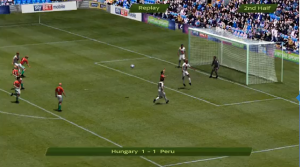Virtual soccer is one of the most popular virtual sports you can play on a number of high-quality sports betting sites. The game offers something completely different to the ‘race’ style of virtual sports that you find in events like horse racing, greyhound racing, motorsports, cycling or similar.
Indeed, with notable commentators from real-life now providing commentary on the matches, the division between what is virtual and what is real is getting increasingly blurred.
Despite this, there are still some key differences between betting on virtual soccer compared to betting on a real soccer game.
In this article, we’ll explore what these differences are and how they impact on the betting options available to you in each case. So let’s begin with arguably the biggest difference between the two types of betting.
Contents
Virtual soccer betting: context and meaning
Perhaps the biggest and most important difference between the two types of sports betting is that in virtual sports gambling, games have no context or meaning beyond producing a set of results.
Bet365 may well organize their games into the Premiership, Euro Superleague, and World Cup. But the games played between the teams under those headings are not actually part of a virtual tournament.
By that we mean other than producing an end result (and thus, a result on each of the betting markets available for that game), the game has no other context. Virtual soccer games do not see the winning team receive three points or advancing in the competition.
Individual players don’t get injured or suspended and miss the next game. A team does not move up or down a table.
Of course, in the vast majority of real-life soccer games, there is significant meaning and context applied to that game. Perhaps only friendlies are the exception.
Teams may well be playing for three points, or to knock their opponent out of a cup competition. The context of the game may well decide how a team approaches a game. If it is the second leg of a two-legged cup tie and the home team is losing, then they will likely play a more attacking style than they would if they were winning the tie on aggregate, for example.
What this context means for betting on soccer
As a punter, the context and meaning we apply to a real-life game will give us clues as to what bets are more likely to be profitable for us.
If a team is missing their two leading goalscorers for a crucial match, we know that they are not as likely to score as many goals in that game. So we would perhaps avoid any bets that would have this team scoring a greater than average number of goals.
As soccer punters, we do this all the time.
But in the world of virtual soccer, there is no context beyond the game itself. There are no individual players, injuries, suspensions, weather conditions, or controversial refereeing decisions.
As such, you are effectively betting blind in virtual soccer. But in one respect that is positive. It means you can often get better odds on these games than you could for real-life games for the same or a similar bet.
Possibilities within the virtual soccer game vs. real-life matches
In a real-world soccer game, there is any number of possibilities that could happen in a game. Most games will conform to somewhere around the norm (2.5 goals per game, 2-4 bookings per game, home team slightly more likely to win, etc.).
But there are times when real-life games will see a high proportion of goals, or many more bookings or sending offs than usual.

In virtual soccer, however, this isn’t possible. The game is designed to produce its results within certain parameters.
One of the key parameters for virtual soccer is that there can be no more than a maximum of four goals scored in any of the games.
This, of course, has an impact on the number of possible scorelines there could be for a virtual soccer game compared to a real-life game. For example, in a real-life game, you can bet on some outside shots for the correct score, such as 3-2, 3-3, 4-3 or perhaps 5-0, 6-0 or even 7-1.
Sure, these scorelines are statistically not likely to happen very often in the real football world, but they do occur some of the time.
Read also: How is virtual football programmed
In virtual soccer, the number of scorelines a game can have is limited by the fact that only a maximum of four goals can be scored. This means that the potential scorelines can only be one of the following 15 options:
Home team wins
- 1-0
- 2-0
- 3-0
- 4-0
- 2-1
- 3-1
(6 possibilities)
Draw
- 0-0
- 1-1
- 2-2
(3 possibilities)
Away team wins
- 0-1
- 0-2
- 0-3
- 0-4
- 1-2
- 1-3
(6 possibilities)
Again, this is not necessarily a bad thing for the virtual soccer punter. This is because the scores that you can bet on are generally the most common scorelines in real-life soccer. As such, you can often get decent odds in the virtual game, better than you would find in a similar real-life match up.
It also means that virtual soccer has fewer possible results, which again tips the balance slightly in favor of the punter compared to the real world.
How results are decided in virtual soccer betting
Obviously this is the biggest and most obvious difference between virtual soccer and the real-life game. In the standard game, the quality of the players, how the players perform individually and as a team, the strategies and skills of the manager plus a healthy slice of luck, the performance of the officials and even things like weather conditions can play a part in deciding the final outcome.
In the virtual world, it is impossible to replicate all these items so the software developers use a complex mathematical process to work out what the result of a game will be. This is based on the two teams competing having some form of handicap positive or negative, applied to them.
Of course, the problem with this is that mathematics is based on logic. Therefore, if this was the only process used to work out results, then the strongest team would win every time and bet on an event would be somewhat pointless.
Virtual sports demand randomness element

So to replicate the individual factors that can alter the result, events, or performance of a team in a real-world game, the software has a built-in random element. This is called a random number generator, or RNG for short. It is this piece of code that is key to allowing punters to bet on virtual soccer (or indeed, any virtual sports game).
By introducing a controlled random element into the game, you produce the conditions for variance in how a result is worked out. The controlled aspect of the random nature of the event means that you still get favorites winning more often, but there is enough variance within that to ensure that it is viable for people to bet on.
It is certainly a much simpler way to work out results and this again has its benefits for the punter.
Individual influence
In real life soccer, you can bet on individual players performing certain tasks or doing certain things in a game. Good examples of this are betting on a named player score the first goal in a match, or a player to get booked in the game.
In virtual soccer, there is no such thing as individual players. There is simply a graphical representation of the mathematical process that works out the score. Thus, these bets are not available and nor do individual players influence the outcome of a virtual soccer game.
While this is the case at the present, I can foresee a time when player names and individual skills are included in future versions of virtual soccer. Then you may well be able to bet on some player-based markets.
But for the time being, the influence of the individual player, manager, or official is still absent from the virtual soccer world.
Virtual soccer betting in the future
These are the four key differences that matter to punters when it comes to betting on virtual soccer compared to real-life soccer.
The markets may well look the same as each other, but the processes used to decide the results does vary significantly from the real world to the virtual. That said, as technology progresses, the line between the two will continue to grow narrower and narrower.
And as sites update the software, the virtual world will only continue to look increasingly like the real-life game.







